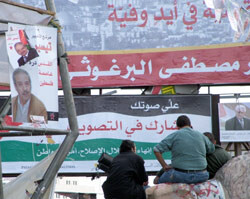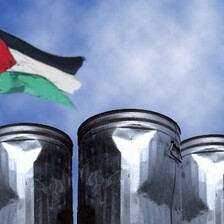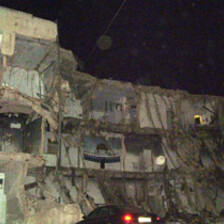Palestine Report 30 December 2004

Men in Ramallah’s Manara square sit surrounded by campaign billboards and posters (Maureen Clare Murphy)
The first phase of the Palestinian municipal elections started this December 23 in 26 municipalities in the West Bank, and Beit Fourik’s townsfolk were out in force. Around the corner from where the two elderly gentlemen were sitting was the Beit Fourik Girls Elementary School, which this day doubled as the largest of the four polling stations in town. Cars adorned with stickers and posters from the different parties were ferrying in voters, and candidates were greeting and making their last minute pitches in a schoolyard atmosphere bordering on carnival-like. Banners and posters adorned the streets and light- and telephone polls. Sound systems, hooked up in the trunks of cars, were belting out loud nationalist songs.
The enthusiasm evident in Beit Fourik was reflected by official figures. Minister of Local Government and head of the higher committee for local elections, Jamal Shobaki, who announced the official results at a press conference on December 26, focused especially on the high turnout. “Voter turnout exceeded all our expectations, and the elections were honest and free despite the difficult circumstances.”
Over 81 percent of the 144,000 eligible voters cast their ballots. Among eligible female voters, 49 percent participated, and female candidates won 17 percent of all seats, well in excess of the 12 percent allocated to them by the quota system.
But the rivalry between Hamas and Fateh remained the talking point. Shobaki tried to take the sting out of it by saying candidates ran on an individual basis rather than according to their respective parties. “The lists were composed of individuals not parties, which means that the voting is for a person, not a faction,” he said.
But it was clear that Hamas had managed to make inroads in traditional Fateh territory. Abu Marwan missed the Israeli-organised municipal elections in 1976 because he was in jail. He spent 18 years in an Israeli prison for smuggling arms for Fateh. He was only released in 1995 as part of the prisoner-release deal under the Oslo Accords. And while he considers himself a “son of Fateh,” he voted Hamas.
He was not alone. Official results were released on December 26, and while Fateh had taken the most seats overall, Hamas had the most to celebrate. The movement had been critical of the staggered local elections and felt the first 26 municipalities had been chosen specifically because they were Fateh strongholds. Nevertheless, Hamas managed to emerge as the largest single faction in 13 of these municipalities.
The exact number of Hamas seats was contested, however. Official sources in Hamas announced that their supporters had won 91 seats in 13 of the 26 constituencies, but according to sources from the local government ministry, Hamas affiliates had won 84 seats to Fateh’s 183 out of a total of 306 seats. The remaining 39 seats were distributed among supporters of various leftist factions and independent candidates.
Observers noted with interest both Fateh’s and Hamas’ insistence on politicizing the results. This, they say, came about because Hamas wants to prove it is a major political player that cannot be ignored on national issues, while Fateh wants to reaffirm its popular platform and hence its leading role in conducting negotiations with Israel and for the leadership of the future state.
According to PLC member and member of the PLO executive committee Ghassan Shakaa, however, “the factions and forces went overboard in politicizing the municipal election results. Such pressure exceeds the tasks and duties of the councils according to the law, which are to provide services such as electricity, water, sewage systems, construction regulations and tax collection. This was one of the criteria for which voters cast their votes.”
Shakaa, who was mayor of Nablus for ten years until the end of last April, also said factions were overplaying their hands a little. “We should not disregard the role of the extended family in choosing the winners. Resorting to family, as we know, occurs in circumstances where people feel that the law is weak and there is an absence of order and security, which are considered key to the success of any elected municipal council that is faithful to its promises and implements its programs for which it was elected.”
Many candidates who did not make it expressed their disappointment about the extent of tribal influence in Palestinian political life, especially in the countryside where this first phase of elections mainly took place.
One agricultural engineer from Beit Fourik, who refused to give his name, said, “I had aspirations and ideas on how to develop the situation in this town. However, I found that I was too weak to bring in enough votes because I am not part of a large extended family. Unfortunately, the factions are boasting of their wins but are disregarding the negative role of the extended family. Certain factions did not dare challenge the influence of the tribe, which is counterproductive to progress. Instead, they allied themselves with the tribe and ran in the elections under their guise.”
Shakaa was less negative in his assessment. “Twenty-eight years after the last municipal elections, we are rebuilding Palestinian institutions in a democratic, honest and transparent manner with the recognition of local and international observers,” he told the Palestine Report.

Related links:





